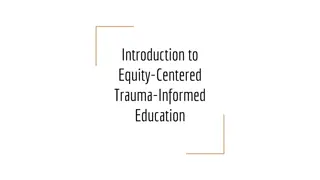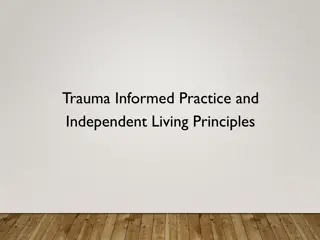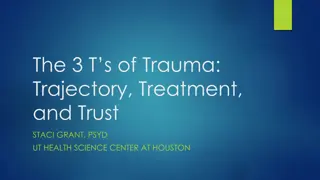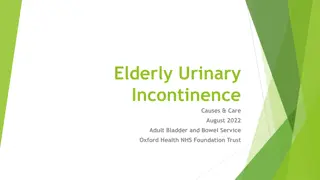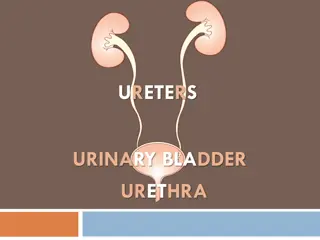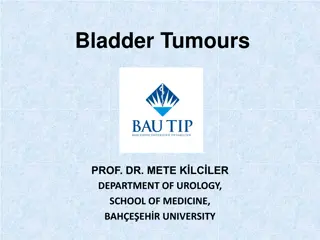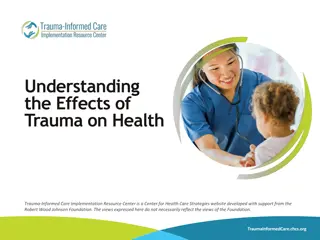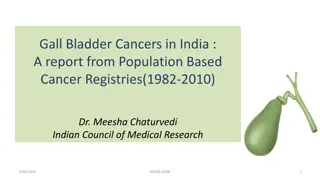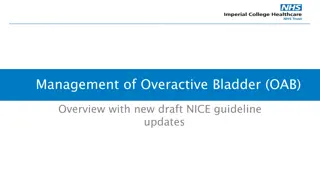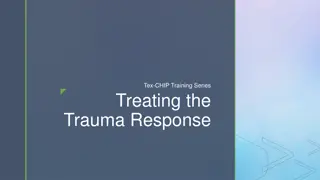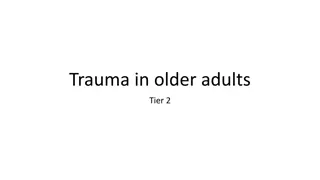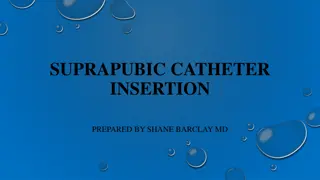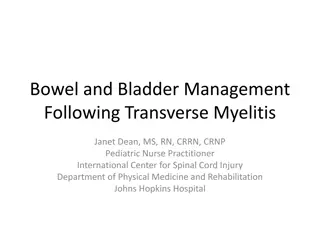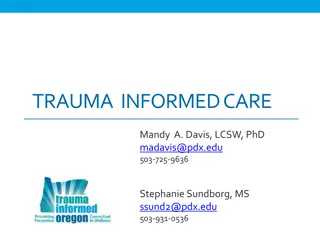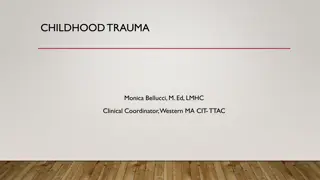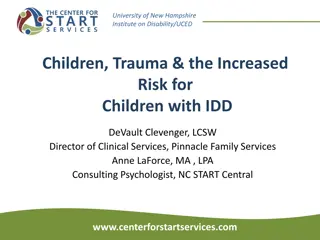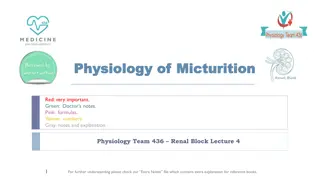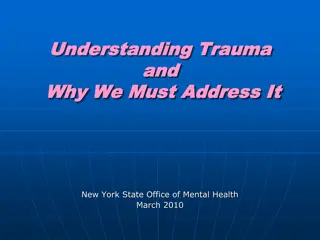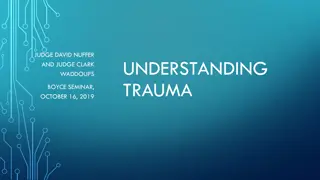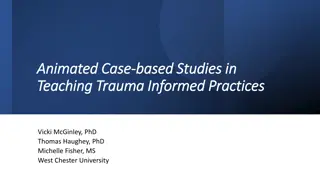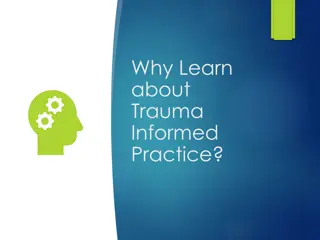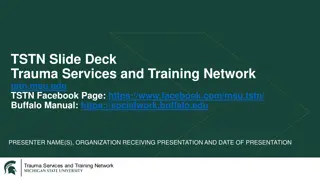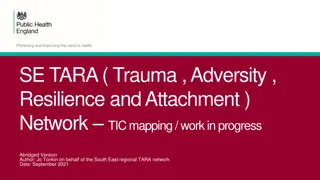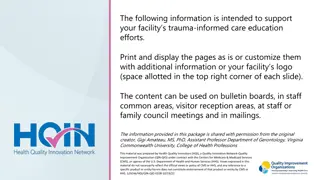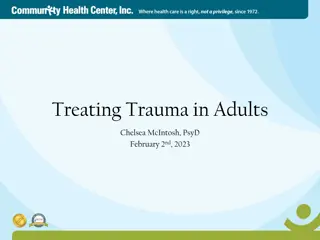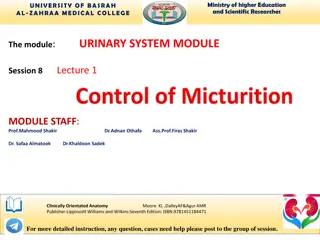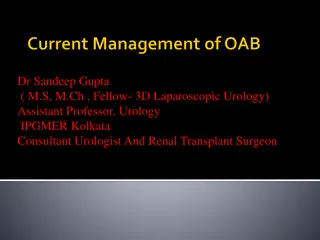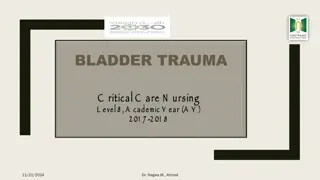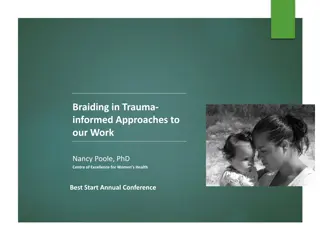Understanding OIG Audits for Trauma Payment Claims
Delve into the intricacies of OIG reviews of trauma payment claims, focusing on the potential impact on Medicare payments for trauma centers and providers. Learn about key issues investigated by the OIG, such as non-designated/verified trauma centers, using revenue codes, trauma team upgrades/downgr
1 views • 28 slides
Understanding Trauma-Informed Techniques on College Campuses
Exploring trauma and its impact on individuals, particularly college students, this presentation delves into recognizing trauma, signs of trauma on campuses, and the role of campus safety and police in addressing and supporting those affected by trauma. Highlighting the importance of empathy, unders
1 views • 22 slides
Equity-Centered Trauma-Informed Education Overview
Explore the fundamentals of Equity-Centered Trauma-Informed Education (ECTIE) including the definition of trauma, examples of potentially traumatic events, and strategies for creating awareness, taking action, and advocating for equity. Learn how to implement trauma-informed practices, address syste
2 views • 49 slides
Building a Trauma-Informed Workplace for Equitable Employment: USDA Symposium 2023
Explore the imperative of creating trauma-informed workplaces at the National Disability Employment Awareness Month Symposium hosted by USDA Target Center. The event sheds light on the prevalence of workplace trauma, its impact on mental health, and steps to advance access and equity. Gain insights
2 views • 36 slides
Understanding Trauma-Informed Practice for Independent Living
Explore the dimensions and types of trauma, including single incident, complex, and developmental trauma, as well as intergenerational and historical trauma. Learn how coping patterns can be passed down through generations and discover the importance of Trauma-Informed Practice (TIP) to support indi
5 views • 15 slides
Understanding Trauma-Informed Safeguarding Practices
Trauma is the result of harmful or life-threatening events, impacting an individual's well-being. Trauma-informed practice acknowledges the effects of trauma on neurological, biological, and psychological development. The body responds to stress with physiological changes, including fight, flight, f
3 views • 8 slides
Understanding the 3 Ts of Trauma: Trajectory, Treatment, and Trust
This comprehensive guide delves into the critical aspects of trauma - Trajectory, Treatment, and Trust. It covers the definition of trauma, PTSD symptoms, potentially traumatic events, trajectories of traumatic stress, and the impact of trauma on mental health. Explore the effects on behavior, biolo
0 views • 29 slides
Understanding Urinary Incontinence in the Elderly
The urinary system plays a vital role in regulating blood volume, pressure, and waste excretion. Urinary incontinence in the elderly can be caused by weak bladder muscles or neurological issues. The bladder consists of 4 layers, each serving a specific function. Normal voiding frequency and bladder
1 views • 50 slides
Understanding Trauma-Sensitive Care for Students During COVID-19
In this presentation by Monique Johnson, LCSW, the importance of trauma-sensitive and responsive care for students during COVID-19 is emphasized. It discusses the impact of trauma, different types of trauma youth may experience, stress reactions, and protective factors. Participants are guided to co
0 views • 17 slides
Understanding Trauma-Informed Care During COVID-19
This primer by Dr. Sheri Gibson explores trauma-informed care in the context of COVID-19, emphasizing the multifaceted individual responses to trauma. It delves into the elements of trauma-informed care, the prevalence of trauma, and provides insights on recognizing and addressing trauma amidst the
1 views • 39 slides
Understanding the Anatomy of Ureters, Urinary Bladder, and Urethra
Explore the detailed anatomy of ureters, urinary bladder, and urethra in this comprehensive guide. Learn about the course of ureters, important relations of the urinary bladder, and differences in male and female urethra. Discover the sites of ureteric constrictions, arterial blood supply, and more.
0 views • 22 slides
Overview of Bladder Tumours: Causes, Symptoms, and Diagnosis
Bladder tumours, particularly Transitional Cell Carcinoma (TCC), are the second most common cancer in the genitourinary system. Mainly caused by factors like cigarette smoking, industrial toxins, and genetic events, bladder cancer presents with symptoms such as hematuria and irritative voiding sympt
0 views • 26 slides
Understanding the Effects of Trauma on Health: Insights from Trauma-Informed Care Implementation
Individual trauma and adverse childhood experiences can have lasting effects on mental, physical, social, and emotional well-being. The Trauma-Informed Care Implementation Resource Center provides valuable insights on defining trauma, examples of traumatic events, prevalence statistics, and types of
0 views • 11 slides
Gall Bladder Cancers in India: A Report from Population Based Cancer Registries (1982-2010)
This report discusses the incidence rates of gall bladder cancers in various regions worldwide, focusing on India. It highlights the significant disparity in rates across different countries and regions. The data analysis includes age-adjusted incidence rates from specific districts in India, as wel
0 views • 34 slides
Management of Overactive Bladder (OAB) - Overview and Guidelines Update
Learn about the assessment, tests, conservative and surgical management options for Overactive Bladder (OAB) based on the new draft NICE guideline updates. Understand the categorization of urinary incontinence types, urine testing protocols, bladder diaries, quality of life assessments, and the role
1 views • 30 slides
Understanding Trauma Response and Treatment in the US
Trauma is prevalent in the US, with unresolved reactions affecting development and relationships. Effective treatment like Cognitive Processing Therapy (CPT) is vital for well-being. Sources of trauma include threats to the body, environmental events, and relational trauma. Responses to trauma vary
0 views • 18 slides
Understanding Trauma in Older Adults: A Comprehensive Overview
Trauma in older adults is often under-recognized and under-treated. It can have lasting adverse effects on their well-being. Recognizing the signs, responding appropriately, and avoiding re-traumatization are crucial steps in supporting older adults who have experienced trauma. Triggers such as anni
4 views • 12 slides
Suprapubic Catheter Insertion Procedure Guidelines
Suprapubic catheter insertion is a procedure indicated for conditions such as urethral injury, obstruction, bladder neck masses, and benign prostatic hypertrophy. It involves proper patient positioning, analgesia, equipment preparation, and a step-by-step technique including bladder palpation, marki
1 views • 12 slides
Bowel and Bladder Management Post Transverse Myelitis
Following transverse myelitis, there can be significant changes in bowel and bladder function, impacting storage, release, and coordination. Neurogenic bowel and bladder issues, differentiated by injury level, can lead to challenges in controlling sphincters and bathroom habits. Understanding these
0 views • 23 slides
Understanding Trauma-Informed Care: Keys to Recognition and Sensory Perception
Trauma-Informed Care emphasizes acknowledging the widespread impact of trauma, recognizing its signs, integrating trauma knowledge into practices, and preventing re-traumatization. The care approach focuses on sensory perception, understanding brain behavior, and recognizing how trauma affects indiv
0 views • 31 slides
Understanding Childhood Trauma and Its Impact on Development
Explore the complexities of childhood trauma with Monica Bellucci, M.Ed., LMHC, as she delves into the identification of trauma, adverse childhood experiences (ACEs), types of abuse, and the effects on brain development. Gain insights on trauma-informed approaches and the importance of early interve
0 views • 33 slides
Understanding Trauma and Promoting Wellbeing in Educational Settings
Explore the impact of trauma on learners' physical and mental wellbeing, especially in the context of COVID-19. Learn about trauma types, good practices, and creating nurturing environments to support individuals affected by trauma. Discover how to apply trauma-informed approaches in educational set
0 views • 10 slides
Understanding Childhood Trauma and Its Impact on Children with IDD
Childhood trauma, defined as intense and overwhelming experiences causing harm to physical and emotional well-being, can have severe repercussions on children with Intellectual and Developmental Disabilities (IDD). This article discusses the concept of trauma, provides examples of traumatic experien
0 views • 45 slides
Understanding the Physiology of Micturition: Bladder Function and Control Mechanisms
Explore the intricacies of micturition physiology focusing on the functional anatomy of the urinary bladder, mechanism of filling and emptying, cystometrogram, and neurogenic control. Delve into the internal structure of the bladder, sphincters, and innervation in males for a comprehensive understan
0 views • 20 slides
Understanding Trauma: Why It Must Be Addressed - Insights from New York State Office of Mental Health
This presentation delves into the critical topic of trauma, defining it, exploring its prevalence, implications, and the differences between trauma-informed and trauma-insensitive systems. It emphasizes understanding trauma's impact, identifying core organizational elements for addressing it, and as
0 views • 36 slides
Understanding Trauma: Causes, Effects, and Healing
Explore the complexities of trauma through insights on the causes, effects, and healing processes. Delve into the impact of PTSD on the brain's attention patterns, common triggers of trauma, and the profound effects trauma can have on individuals. Discover how trauma manifests in hypervigilance, mem
0 views • 20 slides
Understanding Childhood Trauma and Its Impact on Mental Health
Childhood trauma, abuse, neglect, and their repercussions are crucial topics in child and adolescent psychiatry. The content delves into the definitions of trauma, child abuse, and related disorders, exploring their effects on individuals across the lifespan. It highlights the importance of recogniz
0 views • 44 slides
Transforming Education with Trauma-Informed Practices
Schools are now required to implement trauma-informed education to address Adverse Childhood Experiences (ACEs). This involves mandatory training for educators, emphasizing the recognition of trauma signs. Case-based learning is highlighted as a valuable method for preservice teachers to develop cri
0 views • 13 slides
Understanding Trauma, Addiction, and Their Interconnection
Experiencing trauma does not guarantee addiction, but research links trauma to addictive behaviors. Trauma, whether single, complex, or historical, can lead to substance use as a coping mechanism. Psychological trauma like ACEs, childhood maltreatment, and PTSD are significant factors. Co-morbidity
0 views • 12 slides
Understanding Trauma: Key Elements and Neurobiological Impact
Trauma-informed practice involves being aware of trauma's presence, understanding its effects on physical and emotional well-being, and working with trauma symptoms constructively. Trauma can arise from direct exposure, witnessing, or indirect experiences, affecting memory encoding and retrieval. Th
0 views • 23 slides
Trauma-Informed Supervision Practices and Principles
Explore the concept of trauma-informed care, its principles, and core schemas distorted by trauma. Learn how trauma-informed supervision supports staff experiencing trauma, promotes resiliency, and addresses secondary trauma effects. Discover guiding questions for meaningful conversations and provid
0 views • 17 slides
Exploring Trauma-Informed Pedagogy in Education
The content delves into Trauma-Informed Pedagogy, an emerging approach in education particularly relevant during the COVID-19 era. It discusses core principles, the link to trauma-informed care, and offers insights from a literature review. Key points include recognizing the impact of stress on lear
0 views • 17 slides
Understanding Trauma: Definitions, Prevalence, and Impacts
This presentation explores trauma basics, including definitions, ACES, risk and protective factors, resiliency, PTSD, cultural awareness, stereotypes, stigma, and trauma-informed approaches. It also delves into the prevalence of trauma, highlighting statistics on traumatic event exposure among colle
0 views • 7 slides
Understanding Trauma-Informed Care (TIC) and Resilience in the SE TARA Network
This work-in-progress document discusses the aims and objectives of the SE TARA Network in establishing a common language and approach to Trauma-Informed Care (TIC). It highlights strengths and limitations of unifying TIC responses, defines trauma and trauma-informed approaches, and outlines key pri
0 views • 10 slides
Understanding Trauma and Implementing Trauma-Informed Care
Explore the concepts of trauma, trauma-informed care, and the impact of traumagenic experiences on individuals with this comprehensive educational package. Learn about the sources of trauma, nervous system responses, and how to create a culture of trauma-informed care in your facility. Utilize the p
0 views • 7 slides
Recognizing and Treating Trauma in Adults: A Comprehensive Approach
This presentation focuses on assessing, distinguishing, and treating trauma in adults, emphasizing trauma-informed care principles. It discusses various treatment modalities and the importance of recognizing trauma in clients to provide effective care. The session aims to improve patient outcomes by
0 views • 35 slides
Understanding the Urinary System: Bladder Anatomy and Function
Exploring the anatomy and physiology of the urinary system with a focus on the bladder, including details on muscle structure, capacity for urine collection, and the role of the detrusor muscle in micturition. Learn about key components such as the trigone and bladder neck, as well as innervation an
0 views • 19 slides
Understanding Overactive Bladder: Symptoms and Treatment Options
Overactive bladder (OAB) is a common condition characterized by urinary urgency, frequency, and sometimes incontinence. It significantly impacts quality of life and can affect individuals of all ages, with higher prevalence in older populations. Treatment options include drug therapy, bladder traini
0 views • 47 slides
Understanding Bladder Trauma: Etiology, Pathophysiology, and Management
Bladder trauma commonly occurs due to pelvic trauma or surgical interventions, leading to injuries like contusion, intraperitoneal rupture, and extraperitoneal rupture. Dr. Nagwa M. Ahmed presents key elements of bladder trauma, including its etiology, pathophysiology, clinical presentation, diagnos
0 views • 16 slides
Understanding Trauma and Trauma-Informed Approaches in Practice
Exploring trauma and trauma-informed practice through a presentation by Nancy Poole, PhD, at the Best Start Annual Conference. The session delves into trauma's impact, the concept of historical trauma, and the integration of Indigenous and Western knowledge systems in research. It also discusses the
0 views • 46 slides


